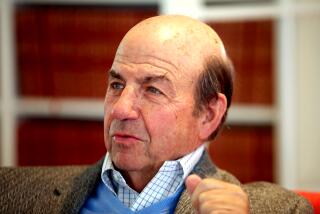‘Daring Young Men’ by Richard Reeves
Richard Reeves, the author of three notable works of presidential biography, has accomplished an important work of historical recovery in his latest book, “Daring Young Men: The Heroism and Triumph of the Berlin Airlift: June 1948-May 1949.”
Even in his most off-handed mode, Reeves is a writer incapable of being less than engrossing, and the rather cumbersome title suggests that his publisher may have been as surprised by the importance of the history that his meticulous research has reconstructed as most readers are sure to be. Though it now has largely faded from memory, the airlift was a seminal event in postwar history. Much of immense consequence flowed from it, including the North Atlantic Treaty Organization and formal division of Germany into a democratic state and a Red tyranny.
By 1948, the Western Allies had largely demobilized the vast military forces. When the Soviets, which is to say, Josef Stalin attempted to seize all of Berlin, which was deep inside their zone of occupation, through a blockade, the U.S. had just 90,000 troops to oppose a million-man Red Army. President Truman’s advisors counseled capitulation. Our British allies advocated an airlift — similar to the one we’d jointly conducted in Burma during the war — to relieve the city. Truman rejected the advice of his inner circle and accepted the British plan. Reeves engagingly reconstructs what followed with particular attention to the young American and British pilots unceremoniously jerked from civilian life and thrown back into crisis and danger.
The best of this author’s history always has been deeply informed by his experience as one of his generation’s finest political reporters. This entertaining book is no exception. He’s been around enough smoky back rooms in New York and Jersey wards to know that the personalities formed there sometimes go on to make history in paneled cabinet meeting rooms. He has a gifted journalist’s eye for the details that comprise a telling portrait and for the way aggregated individual sketches are the building blocks of history’s “big picture.”
Those portraits are drawn with a particular crispness in “Daring Young Men,” and their accumulation gives what’s actually a relatively brief history an enjoyable heft and savor. “Daring Young Men” is particularly fascinating in its portraits of men we’ve mainly forgotten. Take, for example, this description of the logistical and politically farsighted genius who was American commander in Europe when the Soviets imposed their blockade:
“General Lucius Dubignon Clay…was both brilliant and aloof, a courtly but distant man, a descendant of Henry Clay and the son of a U.S. senator from Georgia. He wore few decorations on his uniform and was a chain smoker, rarely photographed without a Camel in his hand. He usually skipped lunch…but was said to drink 30 cups of coffee a day. He sometimes worked 72 hours at a stretch… and was one of the very few Americans ever to become a four-star general without commanding men in combat…
“Clay’s British counterpart in Germany, General Sir Brian Robertson, described him as ‘looking like a Roman emperor and sometimes acting like one.’ Among the Americans who served him there was a joke that Clay was a real nice guy when he relaxed, but he never relaxed.”
He also was a committed democrat who, in the face of much opposition, believed Germany had to be moved as quickly as possible into an economically strong democracy.
Or there’s this portrait of Ernest Bevin, an unwed servant girl’s son, orphaned at age 6. He grew into a hard-fisted ex-truck driver and British labor leader-turned-cabinet minister and was — rather improbably — Clement Attlee’s Foreign Minister at the time of the blockade: “He was the organizer of the huge Transport and General Workers Union and a leader of the great General Strike of 1926. He was a socialist who called most everyone ‘me lad’ .... He was famous for mangled metaphors — ‘Don’t open that Pandora’s box, you never know what Trojan horse will get out’ ....He thought a lot of the Americans. When one asked why he kept a life-size painting of George III behind his desk he answered: ‘E’s my hero. If he hadn’t been so stupid, you wouldn’t have been strong enough to come to our rescue in the war.’ ”
Along with the rest of the Labor government, he stood firmly for the airlift and cajoled the reluctant American military leaders into participation after Harold Macmillan, leader of the Conservative opposition, made this memorable and farsighted declaration to Parliament: “We must, if we are frank with ourselves, for this is a serious and solemn moment in this house, face the risk of war. Grave as that risk is, the alternative policy — to shrink from the issue — involves not merely the risk but almost the certainty of war.”
Though a number of American memoirists and military oral histories credit the U.S. with pushing for the airlift, Reeves’ research convincingly credits the British with this. Thus, he’s able to reconstruct this telephone conversation between Clay and Curtis LeMay (who, predictably, wanted to provoke an incident that would allow him to bomb the Soviets) as the British began flying transports into Germany 24 hours after Macmillan’s speech:
“Curt, have you any planes that can carry coal?”
“Carry what?”
“Coal!”
“We must have a bad connection. It sounds as if you’re asking whether we have planes for carrying coal.”
“Yes, that’s what I said.”
“General,” said LeMay, “The Air Force can deliver anything, anytime, anywhere.”
Despite its desperate and improvised beginnings, the Berlin airlift was an extraordinary technical and political success. The U.S Air Force and the Royal Air Forces of Britain, Australia and New Zealand delivered 2,325,809 tons of supplies to the beleaguered city on 277,569 flights. A total of 81,843 tons of goods stamped “Manufactured in Blockaded Berlin” were flown out.
More important, in a gesture of selflessness unmatched in modern combat, young men of the Allied forces who had flown across Europe to bomb Nazi Berlin into rubble now risked their lives to sustain its people. Those people, through their endurance and resistance, recovered some measure of the historic dignity they had forfeited in their enthusiasm for Hitler and his thugs.
The great Western alliance that one day would contain the Soviet Union into collapse and lead to the foundation of a new, prosperous Germany grew out of the Berlin Airlift — and Richard Reeves has done our collective memory a service by reminding us what we owe those brave flyers.
timothy.rutten@latimes.com
More to Read
The biggest entertainment stories
Get our big stories about Hollywood, film, television, music, arts, culture and more right in your inbox as soon as they publish.
You may occasionally receive promotional content from the Los Angeles Times.






